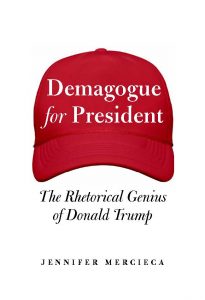When research and politics collide – Jennifer Mercieca’s new book explains how the U.S. created a ‘Demagogue for President’
In Demagogue for President, Jennifer Mercieca outlines six rhetorical strategies used by Donald Trump to win the presidency. Trump took advantage of existing polarization and made expert use of rhetorical strategies to divide, attack and rally his base while intimidating opponents.
By M’kenna Norman

Jen Mercieca near the Century Tree.
Almost 10 years in the making, “Demagogue for President: The Rhetorical Genius of Donald Trump,” is a rhetorical history of the 2016 presidential campaign based on years of communication research by Dr. Jennifer Mercieca.
The result – and the conclusion Mercieca has drawn through critical analysis – is that Trump is the post-rhetorical demagogue for America.
The book explains how Donald Trump took advantage of existing polarization and made expert use of rhetorical strategies to divide, attack and rally his base while intimidating opponents. Written to be highly accessible to non-academics, Mercieca described the book as a historical story told by focusing on six rhetorical strategies, including examples of how Trump uses each one.
The book makes the argument that Trump used these strategies to increase distrust – for one another and for the established political leadership – to win the presidency.
“One of the interesting things I hope people recognize is when you look up the word demagogue, the first definition is a heroic one in which the demagogue defends the rights of the people,” said Mercieca. “The second definition is someone who abuses rhetoric in polarizing propaganda for their own gain.”
Trump did both of these things, which means he is a demagogue, said Mercieca. It is important that readers see how both Trump, and the word demagogue, are judged fairly in the book, she said.
“I try to argue that the standard for judging Trump’s rhetoric – while acknowledging as super effective for achieving his goals – is ultimately bad for American democracy,” said Mercieca. “And so, the standard I use is what’s good for democracy and democratic stability.”
Mercieca had been studying demagoguery for more five years when Trump first emerged as a front-runner in the presidential campaign. She watched and transcribed rallies, read news articles, watched media interviews and read Trump’s prolific Twitter feed. From that, Mercieca analyzed and drew conclusions about culture, polarization and the rhetorical strategies Trump uses to great effect – to achieve office and to consolidate power – as a demagogue.
“The New York Times had asked me to study Trump with them, and I paid attention to what he said for a week,” said Mercieca. “In this week, I saw that he had done six things that I thought were rhetorically noteworthy.”
Those six rhetorical devices were outlined in a paper for The Conversation US that was read by thousands of people and translated into multiple languages, said Mercieca.
“People found my explanations useful,” said Mercieca. “As a rhetoric professor, if you can say something useful – that’s amazing!
“I think that’s maybe one reason why people have found my work so helpful now,” said Mercieca. “While it is very current and of the moment, it is historically informed and grounded in American constitutionalism.”
Mercieca said she had been working on an essay about demagoguery for about six years before Trump’s presidential campaign started. She noted that a demagogue is a leader of the people; it doesn’t have to be bad or evil.
Mercieca was studying the change in the relationship between the press and the president. With the emergence of new media, the U.S. has entered the “post-rhetorical presidency” where a leader can go over Congress and around the news filter to talk directly to the people, explained Mercieca.
“My research showed that a post-rhetorical demagogue would emerge, but I wasn’t sure who that would be until Trump began campaigning,” said Mercieca. “Trump started his campaign and within weeks, other leaders started calling him a demagogue.”

The cover for Jennifer Mercieca’s upcoming book.
Mercieca thought the essay could finally be finished using Trump as the example of a post-rhetorical demagogue. It quickly turned into a book when Trump received the Republican nomination, she said.
“I really wanted to understand who we were accusing of being a demagogue and why,” said Mercieca, “and I wanted to know what that meant for democracy.”
American culture is an outrage culture, said Mercieca, noting it’s possible to point to anything and be outraged about it. Polarization and partisanship in the U.S. are so pervasive people have become gullible to believing one side is always right and the other is always wrong, she added.
“Demagogue for President” is scheduled for release on June 15. Looking back, Mercieca said it was a difficult book to write because it required holding back emotions and approaching Trump’s rhetoric critically. Trump’s strategy is to trigger his opponents, and it’s difficult to closely analyze him and not be triggered, she added.
“What I hope is people can be distant enough from the moment of rhetoric by understanding the stories behind what he is doing and why,” said Mercieca. “I hope the book allows people to think critically about Trump’s rhetoric.
“Above all, I hope it will be useful,” said Mercieca.
- Dept News
- Faculty
- In the Department
- Research
- A&M Author
- Author
- Book
- Communication
- communications
- Demagogue for President
- DemagogueForPresident
- Department of Communication
- Donald Trump
- DonaldTrump
- Dr. Jennifer Mercieca
- Faculty
- Jennifer Mercieca
- JenniferMercieca
- Journalism
- Politics
- President Trump
- Professor
- Publish
- Research
- Texas A&M Author
- Texas A&M Politics
- Texas A&M Trump
- Texas A&M University
- The Conversation US
- TheConversationUS
- Trump
- Trump Twitter
- Writing
